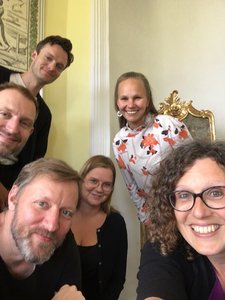
Writing retreat at Sandbjerg Gods, summer 2021
(Professor, Principal Investigator)
Claudia Welz's trilogy "Vox peregrina: A Phenomenology of Listening to What Cannot be Heard" examines three examples of a voice or speech (vox) that is foreign (peregrina) in the sense that it is experienced as reaching one ‘from outside,’ yet transforming one’s innermost by changing the dialogical relations between self and other:
Claudia Welz's trilogy "Vox peregrina: A Phenomenology of Listening to What Cannot be Heard" shall clarify the connection between listening, understanding, and existential reorientation by investigating the metamorphosis of different dialogical relations. It examines three examples of a voice, a word, or speech (vox) that is foreign (peregrina) in the sense that it is experienced as reaching one ‘from outside,’ yet transforming one’s innermost by changing the relations between self and other:
Part 1 “The Call of Conscience: Self-Disclosure and Self-Deception” focuses on interhuman dialogue
Part 2 “Prayer: God’s Word and Silence” focuses on divine-human ‘dialogue’
Part 3 “‘Alien Voices’ as Paradoxical Powers of Powerlessness: Trauma, Delusion, and Self-Surrender” focuses on intrapsychic imaginary ‘dialogue’
It is not a coincidence that the metaphor of the ‘voice’ circumscribing the relation between interiority and exteriority is acoustic rather than visual. It at once provokes and undermines spatial images, which imply a certain topology of the mind and the self-other-relation. While a picture captures a certain, more or less fixed, state of affairs, the sound waves of the voice are underway, moving from one place to another. Consequently, the overall aim of the trilogy “Vox peregrina: A Phenomenology of Listening to What Cannot be Heard” is not primarily to describe structures such as ‘foreignness within the familiar,’ but rather experiential movements of understanding and time traveling in thought and emotion, memory and imagination. More specifically, the trilogy’s aim is threefold:
(1) Its ethical part, which deals with interhuman relations, explores the manifestation of the ‘voice’ or ‘call’ of conscience, which in the first instance makes itself ‘heard’ by affecting one through self-other-conscious emotions like shame and guilt. Conscience is not neutral but subjective in a promising and a problematic sense, namely as a medium of self-disclosure and a source of self-deception. How can one orient oneself ethically in conflicts of conscience and moral dilemmas?
(2) The part of the project that deals with the divine-human relation concentrates on the meaning of God’s ‘Word’ as conveyed by the Hebrew Bible and the New Testament, and God’s perceived ‘silence’ after Auschwitz. How can we identify what God ‘says’ to us and wants us to do, and how can we know whether or in what sense a prayer has been ‘heard’ or ‘answered’ if God’s ‘voice’ is not audible in the ordinary sense of the word? These are questions of religious orientation.
(3) The third part of the project investigates ‘alien’ (i.e. self-alienating) voices experienced by, for instance, severely traumatized patients. How is it possible to distinguish between a shared reality and delusion if the quality of ‘sound’ is the same in real and hallucinatory voices, and how exactly can existential re-orientation succeed through imaginary ‘dialogues’ with these disembodied voices?

(Postdoctoral research fellow)
“Exploring the Dialogical Constitution of Human Existence in Theological Anthropology” examines, in light of a Lutheran-inspired theological anthropology, the second-person perspective, with a particular emphasis on the dialogical constitution of the human God-relation implied in the theological understanding of human existence.
With this sub-project, I study the influence of the second-person perspective and the dialogical character of the human relationship to God on theological anthropology, especially as expressed in Martin Luther’s relational ontology. Moreover, I explore possible connections between modern philosophical theories of dialogue, such as Martin Buber’s, and Lutheran theology and contribute to systematic theological reflection on the role of dialogue for contemporary theological anthropology.
“Look on me and answer, Lord my God” (Ps 13:4). This is the despairing cry of the psalmist, admonishing God to enter into dialogue with his suffering creatures. In the Bible and the theological tradition, human existence is dialogically constituted. In dialogue with God, the human being becomes a ‘you’ in relation to God’s creative and saving ‘I’. And the ‘I’ emerges as a self, calling upon God’s ‘you’ in confession, in prayer, and in praise. However, engaging in dialogue with God is terrifying and potentially life threatening, since God holds power not only to create and to sustain, but also to judge and destroy. Job is the prime example of one, who experiences God’s dangerous presence. As the verse from Psalm 13 shows, though, expulsion from dialogue with God is even more threatening, since human existence depends on the continuous word exchange with him, who creates and sustains life. Lutheran theology calls the process, in which God forces the reluctant sinner into dialogue, justification, and the second-person perspective is fundamental to Lutheran relational anthropology. Moreover, a central claim in Luther’s theology is that God becomes God in dialogue with human beings. Whereas the metaphysical God per se utters his truths in monologues and remains unaffected by the sinful self-centeredness of humans, God, who reveals himself pro te, invites humans into dialogue and depends on them answering him in praise and glorification, whereby he is recognised as God.
The sub-project has three focal points analysing different aspects of this role of dialogue in theological anthropology:
1. Trust and Recognition as the ‘In-between’ of Human Dialogue with God
I will examine the status and quality of the ‘in-between’ of human dialogue with God exploring the potential of a modern reformulation of justification as a dialogical event focusing on notions of trust and recognition. Trinitarian theology allows for a personification of the dia in the figures of the Holy Spirit and the Paraclete, who serve as intermediaries between the divine and the human. However, in Lutheran theology with its distinctive Christological focus, the dia enabling the dialogue between God and humans is more often explained as faith in Christ. Luther continuously expounds faith as trust (fiducia, Zuversicht, Vertrauen) and explains the human relationship to God and neighbour as characterised by either mistrust (sin) or obedient trust. The latter relationship is based on a mutual exchange of honour between God and humans, which a contemporary Lutheran theology might interpret as recognition.
2. Bridging the Gap between Epistemology and Ethics in Theological Dialogues
At the core of theological anthropology lies a fundamental hermeneutical problem concerning the ability of humans to recognise God as God and obey his will, which can only be overcome through the God-human relationship of faith. Thus, according to Luther, ethical action is preconditioned by the trusting faith relationship to God. Only the Christian ‘I’, who is constituted by the divine ‘you’ and lives extra se in Christ, is able to overcome its sinful disposition and perform spontaneous acts of love towards their neighbour. I investigate how, in the theological tradition, this process of bridging the gap between epistemology and ethics takes place in confessional dialogues with God, such as that of Augustine, and in didactic dialogues between teacher and student, such as Anselm’s Cur Deus homo? and catechetical literature, most notable Luther’s Kleine Katechismus. In both cases, the dialogue seeks to establish a relationship of trust and recognition between God and the human being, which serves as precondition for sinners to act righteously.
3. Emotional Aspects of Human Dialogue with God
As the initial quote from Psalm 13 shows, human dialogue with God is not a mere cognitive endeavour, but has a strong emotional component. In Lutheran theology, dialogue with God unfolds in the interplay betweenintellectus and affectus. I will research the affective dimension of human dialogue with God through analysis of for instance Luther’s Deutsche Auslegung des Vaterunsers für die Einfältigen Laien, which displays the Lord’s Prayer as an at times tempestuous dialogue between the prayer itself, which accuses and mediates God’s forgiveness, and the repentant praying person in outmost emotional despair.
(Postdoctoral research fellow)
“Love: The Middle Term in Dialogue” investigates the second-person perspective of dialogue through Kierkegaard’s notion of love as the “middle term” (Mellembestemmelsen) in Works of Love.
In this sub-project, the 2. person perspective of dialogue will be investigated with Søren Kierkegaard’s notion of love as the “middle term” (Mellembestemmelsen). Kierkegaard develops this notion in Works of Love, where he draws attention to the following distinction: Worldly wisdom, he says, teaches that “…love is a relation between human and human.” Christianity, on the contrary, teaches that it is "…a relation between: human – God – human, i.e., that God is the middle term.” This is easily misunderstood, though, since worldly wisdom has its own concept of “middle term.” It takes it to be a third thing by which a common measure – a commensurability – between two things is established. The renowned meter bar in Paris, for instance, establishes a commensurability between the Eifel Tower and Mount Everest in terms of height; and money, it is sometimes claimed, establishes a universal equivalence such that everything becomes commensurable in terms of monetary value. This is not what “middle term” means when this notion is attributed to love. “Worldly reason does not notice that love is not at all something third, for itself, but is the middle term,” as Kierkegaard writes. As middle term, love is rather the incommensurability of all beings, which is the same as to say that it is the singularity of each thing. And love creates this singularity in a call to which each singular being responds and, by that token, is called forth into being, i.e., created. “…each singular being responds to God as middle term,” as Kierkegaard writes (…til Gud som Mellembestemmelsen svarer “den Enkelte”).
The human being is distinguished by not only being called forth (created) but, more precisely, by being called forth into language. The human being is – according to an old tradition – the animal with the ability to speak (zoon logon echon). It has its being in language. As such, it is eminently “the responsive being.” At the same time, it is – according to the same old tradition – the political animal (zoon politikon). It lives in communities whose dimension – in correspondence with its essence – is dialogue. What distinguishes us here, as animals with the ability to speak, is not, however, the transmission of information. Not only do we find such a transmission throughout the animal kingdom, we find it perfected here to a degree that human beings can perhaps imitate in their daily communication but never attain. On the contrary, human beings always stumble on ambiguity, vagueness, digression, displacements and even meaninglessness. This apparent linguistic deficiency, however, is only the flipside to the fact that human beings are never in the grip of their art-defining potentiality to speak. On the contrary, they master this potentiality precisely because they can let go of it. And they can let go of it because they maintain themselves in a relation to the beginning of language – its arché. It is this beginning which is the creative word of God and about which it is famously said in the opening words of the Gospel of John: “In the beginning was the Word, and the Word was with God, and the Word was God.” The human being – the responsive being – maintains itself in relation to this word of beginning which has called it forth. And it is on the strength of this relation that human beings can begin anew – which does not so much mean that they can say something new but rather that they, in addressing the other, can recall the word and in doing so renew the dialogical being with the neighbor. It is this event of language that abandons our communication – and our communities – to dialogue.
(Postdoctoral research fellow)
“A Study of Løgstrup’s Conception of Revelation and Ethics” investigates Løgstrup’s notion of revelation and how it enters into and operates in Løgstrup’s conception of Christianity and ethics.
My contribution to the research project will consist in an exploration of Løgstrup’s view on dialogue as a revelatory structure. In Løgstrup’s view, an important part of revelation is the revelation of created ontological structures in human existence. These structures are disclosed through dialogue and in light of the Christian revelation, so that revelation and creation are ‘tied together’: the Christian proclamation can reveal “something in our existence which we were completely unaware of – until the proclamation disclosed it by addressing it” (The Ethical Demand 2020, 3). Important examples of these revealed structures are ‘interdependence’, ‘the ethical demand’ (i.e. ethics as a whole) and the so-called ‘sovereign expressions of life’ (in this connection especially Løgstrup’s notion of the dialogical structure in what he refers to as the ‘openness of speech’). Here, Løgstrup’s work holds the potential for unfolding an original and important position on how to relate faith and understanding, theology and philosophy, and revelation and reason to each other, something that has so far been overlooked in the reception of Løgstrup.

(Postdoctoral research fellow)
“Dialogues with imaginary others: Exploring the ontology, epistemology and ethics of the ’in-between’ through autobiographical stories” develops a new phenomenological analysis of and auto-ethnographic approach to dialogue with respect to real and fictive interlocutors.
What is the in-between of fact and fantasy, the in-between of self and other, and the in-between of affect and intellect? During this sub-project I will investigate the ‘in-between’ of dialogue through autobiographical stories. The stories are based on encounters with 1) actual persons, 2) imaginary characters, and 3) God. The research method is phenomenological, with a special emphasis on utilizing listening as metaphor and method of inquiry. To reveal the methodological stance, I draw inspiration from ethnography, especially autoethnography, and writing as method. In this way I manage to do phenomenological work through engaging with the empirical material and performing creative writing as ways to grasp and address the research questions.
The quality, status and ethics of the ‘in-between’ that mediates the dialogical relation between self and other are different in all three cases due to the different ontological status of interlocutors. For instance, time, space and materiality are constituted in a different way in dialogues between actual human beings, between imaginary characters, such as in fictional works, and between humans and God, such as in prayer. On further reflection, it is questionable whether literary dialogue can be regarded as dialogue, if the element of ‘other’ is considered essential for dialogue. Perhaps the same thing is true with prayer. However, my own writing experience in previous research suggests that sometimes there are outbursts of electrified traumatic moments, through which an element of ‘other’ can emerge. This poses interesting questions with regard to epistemology and ethics of the ‘in-between.’ Perhaps the truth called for in dialogical encounters is best understood as aletheia, the unconcealing of what something is, resulting in an ethical demand for mutual disclosure of novel attunements to the world and to the ‘other.’
The use of listening as metaphor and method, and the combination of empirical and philosophical methods, summons affective dimensions in an effective way compared to traditional philosophical analysis, which operates mainly with the intellectual dimension. When observing, documenting and analyzing dialogues during the research, I will pay special attention to the relation between affective and intellectual dimensions as a way of knowing. In addition, at least some of the publications of this sub-project will utilize literary dialogue in order to extend the exploration of the affective dimension over the whole span of the research project.
(Postdoctoral research fellow)
“In-finite Dialogue: Exploring the In-Between-Us” examines the ‘meaning’ of dialogue as a happening-in-between-us, as an exposition of singularities constituted in the very between us.
The goal of this project is to offer an understanding of dialogue as a happening-in-between-us. Based on an idea of dialogue as a communication between “You and I”, “ownness and otherness”, the project examines the relation between “You and I”, in which each one is recognising in the other the same capacity to speak as one’s own and is thus seeing in the other nothing other than another “I”. To do this, the project argues that the prefix dia- in dialogue can be understood as an exposition of the gathering principle of logos to the “between”, the division and dispersal among the participants of the dialogue, rather than reconciling all differences into unity. In emphasising the importance of the dia-, with reference to Jean-Luc Nancy’s notion of a “sharing of logos”, the project conceives of the dialogue in terms of an interlacing that divides us, and yet in dividing us interlaces us.

(Research assistant)
“Language and Religious Skepticism: David Hume in Conversation with John Hick, Menachem Fisch and Martin Buber”
“Language and Religious Skepticism: David Hume in Conversation with John Hick, Menachem Fisch and Martin Buber”
My contribution to the project focuses on early modern philosophy and Jewish studies, in particular epistemology and philosophy of dialogue. I consider David Hume, one of the most important skeptical thinkers of the early modern period, as main interlocutor of the project. His writings on religion are then brought in conversation with the works of (i) John Hick for what concerns the possibility of talking about God (ii) Menachem Fisch and Martin Buber concerning philosophy of dialogue. My role in the team will also be to facilitate the organization of forthcoming conferences and meetings connected with the project.

(Affiliated researcher)
“The Diastasis of Dialogue: Event, Transformation and Affectivity” explores the question: Under what conditions are dialogue possible?
“The Diastasis of Dialogue: Event, Transformation and Affectivity”
My main area of research includes philosophy of existence, phenomenology, hermeneutics, philosophical topography, continental philosophy of religion, speculative realism, object-oriented ontology, and the environmental humanities with a specific interest in the ontological and ethical problems emerging in the wake of anthropogenic climate change. I am especially interested in classical metaphysical questions invoked in contemporary contexts. My interest in theological matters orbits around the question of divinity and the death of God as portrayed in the fields of philosophy, theology, and literature from Kierkegaard and the late Heidegger over deconstruction and radical hermeneutics to twenty-first century divinology and speculative materialism.
I am currently working on a project entitled “The Diastasis of Dialogue: Event, Transformation and Affectivity” where I explore the question: under what conditions are dialogue possible? My claim is that dialogue is a form of responsivity where that which constitutes the dialogue is constantly re-negotiated and conditioned in turn through the dialogical enterprise itself. I focus on three central and inter-related aspects: 1) the event that provokes the dialogue, 2) the transformative power of dialogical praxis and 3) affectivity as the qualified medium in which dialogue unfolds. Dialogues are provoked, shaped, and conditioned by what happens but due to their integral openness to that which has not yet been said, heard or seen, they can expose and challenge the dominant dogmas of the day.